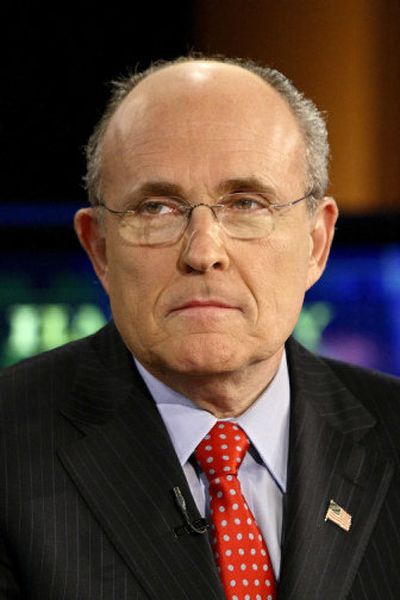Giuliani staff brutally honest in ‘93 report

WASHINGTON – Sometimes in politics, the most damaging accusations come from your own staff.
Rudy Giuliani learned that lesson again Tuesday when a “vulnerability study,” including warnings about his “weirdness factor” and other perceived liabilities, surfaced from his second campaign for New York mayor, 14 years ago.
Last month, the New York Daily News obtained a secret blueprint for Giuliani’s expected Republican presidential bid that detailed concerns such as his liberal views on social issues and his messy divorce from his second wife, Donna Hanover.
The 1993 report by two aides in Giuliani’s mayoral campaign was obtained by Village Voice reporter Wayne Barrett for a book on Giuliani and was posted on the Smoking Gun Web site. Giuliani went on to defeat incumbent David Dinkins in that campaign, four years after losing to him. He was re-elected in 1997.
The “weirdness” question involved Giuliani’s first marriage, to his second cousin. He had his 14-year union with Regina Peruggi annulled on grounds that the Roman Catholic Church had never properly approved the marriage. The 1993 memo said that Giuliani had given a “wide array of conflicting answers” about his personal life, bringing “the soundness of his judgment” into question, but that any attempt to question the marriage or his fidelity “should be deflected as a shameless act of negative campaigning.”
In an echo of Giuliani’s current quandary – that his support for abortion and gay rights may alienate many conservative voters – the 1993 memo declared: “He doesn’t really fit in with the Republicans. Too liberal.”
Giuliani’s aides were also concerned that, as a former Democrat, he would be painted as a flip-flopper, and that his tenure as an official in Ronald Reagan’s Justice Department was an albatross for a liberal city. “There is not a minute to waste in inoculating against the Reagan Republican moniker,” the memo said, adding that the candidate should emphasize his “independence from traditional national Republican policies.”
Giuliani was deemed “vulnerable to charges of insensitivity toward racial minorities,” the memo said, in urging him to soften his image. “Rudy Giuliani can – and should – be redefined for all voters, but especially minority voters.” Giuliani had strained relations with black leaders and communities during his two terms as mayor.
Although some opponents painted him as “anti-gay,” the report said, “gay marriage really is the only issue where Giuliani opposes the gay agenda.”
While a supporter of abortion rights, Giuliani had stumbled badly on the issue in his 1989 mayoral campaign, sounding like “just another pro-life male politician trying to explain how he wasn’t anti-woman,” the memo said. The advisers said Giuliani could “win over undecided pro-choice activists” by being more “succinct” about his support for the procedure and for public financing of abortions.
The memo also reported the “charge” that “Giuliani received special treatment from a friendly federal judge to avoid military service during the Vietnam War,” and later “hypocritically prosecuted draft-dodgers.” Giuliani, who was dropped by an Air Force ROTC program because of a hearing problem, received a rare occupational deferment in 1969 after a federal judge wrote a letter about the importance of his duties as a law clerk.
A spokeswoman for Giuliani’s presidential exploratory committee did not respond to requests for comment.